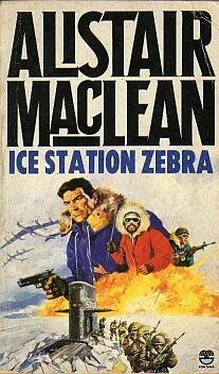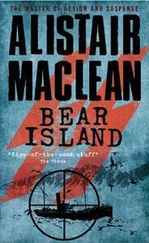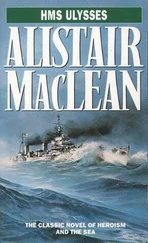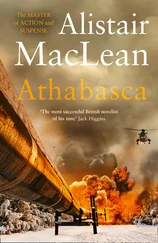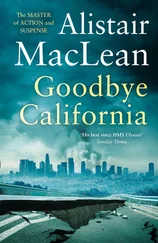Alistair MacLean - Ice Station Zebra
Здесь есть возможность читать онлайн «Alistair MacLean - Ice Station Zebra» — ознакомительный отрывок электронной книги совершенно бесплатно, а после прочтения отрывка купить полную версию. В некоторых случаях можно слушать аудио, скачать через торрент в формате fb2 и присутствует краткое содержание. Год выпуска: 1963, Жанр: Триллер, Боевик, на английском языке. Описание произведения, (предисловие) а так же отзывы посетителей доступны на портале библиотеки ЛибКат.
- Название:Ice Station Zebra
- Автор:
- Жанр:
- Год:1963
- ISBN:нет данных
- Рейтинг книги:3 / 5. Голосов: 1
-
Избранное:Добавить в избранное
- Отзывы:
-
Ваша оценка:
- 60
- 1
- 2
- 3
- 4
- 5
Ice Station Zebra: краткое содержание, описание и аннотация
Предлагаем к чтению аннотацию, описание, краткое содержание или предисловие (зависит от того, что написал сам автор книги «Ice Station Zebra»). Если вы не нашли необходимую информацию о книге — напишите в комментариях, мы постараемся отыскать её.
Ice Station Zebra — читать онлайн ознакомительный отрывок
Ниже представлен текст книги, разбитый по страницам. Система сохранения места последней прочитанной страницы, позволяет с удобством читать онлайн бесплатно книгу «Ice Station Zebra», без необходимости каждый раз заново искать на чём Вы остановились. Поставьте закладку, и сможете в любой момент перейти на страницу, на которой закончили чтение.
Интервал:
Закладка:
"That's very comforting," I said. "How long will it take you to restart the reactor?"
"At least an hour. That's after the fire has been put out and everything checked for safety. At least an hour."
"And Swanson reckoned three or four hours to put the fire out. Say five, all told. It's a long time. Why doesn't he use some of his reserve power cruising around to find a lead?"
"An even bigger gamble than staying put and trying to put out the fire. I'm with the skipper. Let's fight the devil we know rather than the one we don't."
Medical case in hand, Jolly came coughing and spluttering his way back into the control center and started pulling on a suit and breathing apparatus. Hansen gave him instructions on how to operate it, and Jolly seemed to get the idea pretty quickly. Brown, the enlisted man who'd helped Cartwright into the control center, was detailed to accompany him: Jolly had no idea of the location of the ladder leading down from the upper engine room to the machinery space.
"Be as quick as you can," Swanson said. "Remember, Jolly, you're not trained for this sort of thing. I'll expect you back inside ten minutes."
They were back in exactly four minutes. They didn't have an unconscious Ringman with them, either. The only unconscious figure was that of Dr. Jolly, whom Brown half carried, half dragged over the sill into the control room.
"Can't say for sure what happened," Brown gasped. He was trembling from the effort he had just made; Jolly must have outweighed him by at least thirty pounds. "We'd just got into the engine room and shut the door. I was leading, and suddenly Dr. Jolly fell against me. I think he must have tripped over something. He knocked me down. When I got to my feet, he was lying there behind me. I put the flashlight on him. He was out cold. His mask had been torn loose. I put it on as best I could and pulled him out."
"My God," Hansen said reflectively. "The medical profession on the «Dolphin» «is» having a rough time." He gloomily surveyed the prone figure of Dr. Jolly as it was carried away toward the after door and relatively fresh air. "All three sawbones out of commission now. That's very handy, isn't it, skipper?"
Swanson didn't answer. I said to him, "The injection for Ringman. Would you know what to give, how to give it and where?"
"No."
"Would any of your crew?"
"I'm in no position to argue, Dr. Carpenter."
I opened Jolly's medical kit, hunted among the bottles on the lid rack until I found what I wanted, dipped a hypodermic and injected it in my left forearm, just where the bandage ended. "Pain-killer," I said. "I'm just a softy. But I want to be able to use the forefinger and thumb of that hand." I glanced across at Rawlings, as recovered as anyone could get in that foul atmosphere, and said: "How are you feeling now?"
"Just resting lightly." He rose from his chair and picked up his breathing equipment. "Have no fears, Doc. With torpedoman first class Rawlings by your side — "
"We have plenty of fresh men still available aft, Dr.Carpenter," Swanson said.
"No. Rawlings. It's for his own sake. Maybe he'll get two medals now for this night's work."
Rawlings grinned and pulled the mask over his head. Two minutes later we were inside the engine room.
It was stiflingly hot in there, and visibility, even with the powerful beam of our flashlights, didn't exceed eighteen inches; but for the rest it wasn't too bad. The breathing apparatus functioned well enough, and I was conscious of no discomfort. At first, that was.
Rawlings took my arm and guided me to the head of a ladder that reached down to the deck of the machinery space. I heard the penetrating hiss of a fire extinguisher and peered around to locate its source.
A pity they had no submarines in the Middle Ages, I thought; the sight of that little lot down there would have given Dante an extra fillip when he started in on his Inferno. Over on the starboard side, two very powerful floodlights had been slung above the huge turbine: the visibility they gave varied from three to six feet, according to the changing amount of smoke given off by the charred and smoldering insulation. At the moment, one patch of the insulation was deeply covered in a layer of white foam — carbon dioxide released under pressure immediately freezes anything with which it comes in contact. As the man with the extinguisher stepped back, three others moved forward in the swirling gloom and started hacking and tearing away at the insulation. As soon as a sizable strip was dragged loose the exposed lagging below immediately burst into flame reaching the height of a man's head, throwing into sharp relief weird masked figures leaping backward to avoid being scorched by the flames. And then the man with the CO2 would approach again, press his trigger, the blaze would shrink down, flicker, and die, and a coat of creamy white foam would bloom where the fire had been. Then the entire process would be repeated all over again. The whole scene with the repetitively stylized movements of the participants highlit against a smoky, oil-veined background of flickering crimson was somehow weirdly suggestive of the priests of a long-dead and alien culture offering up some burnt sacrifice on their blood-stained pagan altar.
It also made me see Swanson's point: at the painfully but necessarily slow rate at which those men were making progress, four hours would be excellent par for the course. I tried not to think what the air inside the Dolphin would be like in four hours' time.
The man with the extinguisher — it was Raeburn — caught sight of us, came across, and led me through a tangled maze of steam pipes and condensers to where Ringman was lying. He was on his back, very still, but conscious: I could see the movement of the whites of his eyes behind his goggles. I bent down till my mask was touching his.
"Your leg?" I shouted.
He nodded.
"Left?"
He nodded again, reached out gingerly, and touched a spot halfway down the shinbone. I opened the medical case, pulled out scissors, pinched the clothes on his upper arm between finger and thumb, and cut a piece of the material away. The hypodermic came next and within two minutes he was asleep. With Rawlings' help, I laid splints against his leg and bandaged them roughly in place. Two of the fire fighters stopped work long enough to help us drag him up the ladder, and then Rawlings and I took him through the passage above the reactor room. I became aware that my breathing was now distressed, my legs shaking, and my whole body bathed in sweat.
Once in the control center, I took off my mask and immediately began to cough and sneeze uncontrollably, tears streaming down my cheeks. Even in the few minutes we had been gone, the air in the control room had deteriorated to a frightening extent.
Swanson said, "Thank you, Doctor. What's it like in there?"
"Quite bad. Not intolerable, but not nice. Ten minutes is long enough for your fire fighters at one time."
"Fire fighters I have plenty of. Ten minutes it shall be."
A couple of burly enlisted men carried Ringman through to the sick bay. Rawlings had been ordered for'ard for rest and recuperation in the comparatively fresh air of the mess room, but he elected to stop off at the sick bay with me. He'd glanced at my bandaged left hand and said, "Three hands are better than one, even though two of them do happen to belong to Rawlings."
Benson was restless and occasionally murmuring but still below the level of consciousness. Captain Folsom was asleep, deeply so, which I found surprising until Rawlings told me that there were no alarm boxes in the sick bay and that the door was completely sound-proofed.
We laid Ringman down on the examination table, and Rawlings slit his trouser leg with a pair of heavy surgical scissors. It wasn't as bad as I had feared it would be: a clean fracture of the tibia, not compound. With Rawlings doing most of the work, we soon had his leg fixed up. I didn't try to put his leg in traction; when Jolly, with his two good hands, had completely recovered, he'd be able to make a better job of it than I could.
Читать дальшеИнтервал:
Закладка:
Похожие книги на «Ice Station Zebra»
Представляем Вашему вниманию похожие книги на «Ice Station Zebra» списком для выбора. Мы отобрали схожую по названию и смыслу литературу в надежде предоставить читателям больше вариантов отыскать новые, интересные, ещё непрочитанные произведения.
Обсуждение, отзывы о книге «Ice Station Zebra» и просто собственные мнения читателей. Оставьте ваши комментарии, напишите, что Вы думаете о произведении, его смысле или главных героях. Укажите что конкретно понравилось, а что нет, и почему Вы так считаете.
